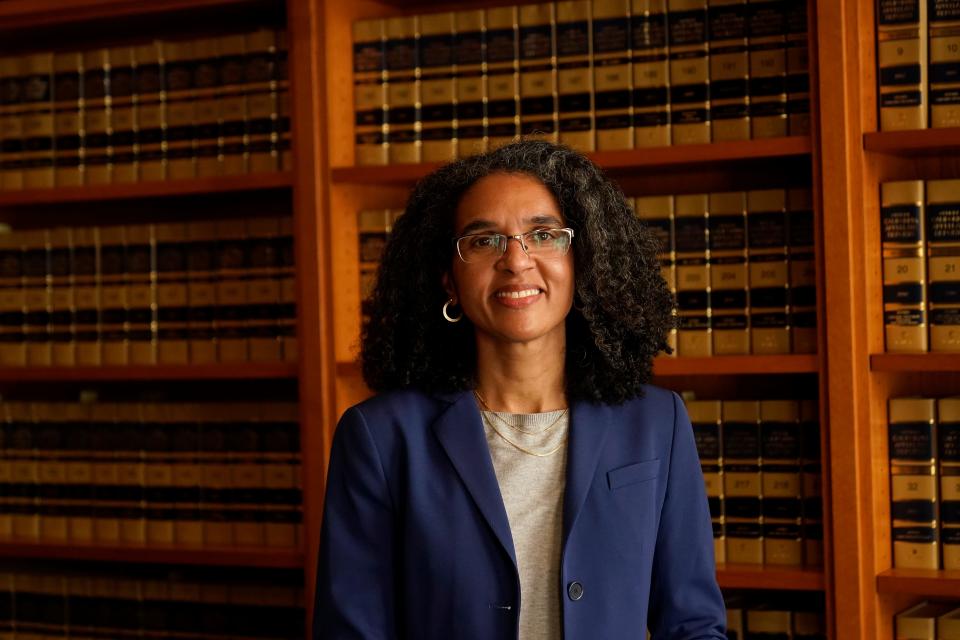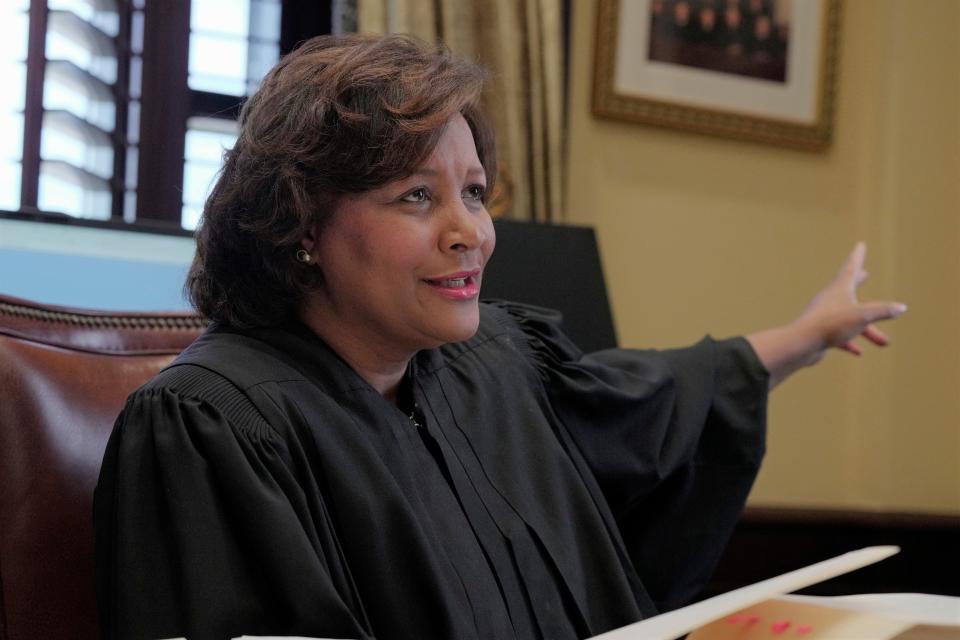Not just the Supreme Court: Biden poised to triple number of Black women on federal appeals courts
- Oops!Something went wrong.Please try again later.
WASHINGTON – President Joe Biden will soon make history when he announces a Supreme Court nominee who will be the first Black woman selected for the high court.
But when it comes to lower federal courts, the administration has already had a major impact.
The White House is poised to triple the number of Black women appellate judges, from four when Biden took office, to at least 13. If all of those women are confirmed by the Senate in coming weeks, it would mean a Black woman will sit on nine of 13 federal appeals courts and would make up about 7% of the nation's 179 appellate judgeships.
Advocates for diversity on the federal bench have applauded the speed at which the administration has filled openings with an eye toward elevating women of color and also ensuring candidates with different professional backgrounds are represented. Biden nominated more former public defenders in his first year than any other president.
"He’s definitely changing and diversifying the courts and that is good for the country," said Melanie Campbell, president of the National Coalition on Black Civic Participation. "Race and gender and class and culture – all of those things affect how one thinks and how those who are sitting on the bench interpret the law."
Biden has said he will name a Supreme Court nominee by the end of the month to replace retiring Associate Justice Stephen Breyer. Late last month, the president was considering more than a dozen Black women – including judges, civil rights leaders and academics. Biden told NBC News on Feb. 10 he had conducted "deep dive" investigations into "about four " candidates for the job but he has not named them.
First Black woman: Race, gender become factors in Supreme Court confirmation battle
Talking about race: Supreme Court fight underscores America's struggle to discuss equity
Among the likely candidates are Judge Ketanji Brown Jackson, who has served on the U.S. Court of Appeals for the D.C. Circuit since June; California Supreme Court Justice Leondra Kruger; and Judge J. Michelle Childs, a U.S. District Court judge from South Carolina. Two of them were nominated last year to a federal appeals court by Biden. Jackson was confirmed and Childs' confirmation hearing is on hold for now.
Biden first promised to name a Black woman to the Supreme Court two years ago this week on a debate stage ahead of the pivotal Democratic presidential primary in South Carolina. Assuming he wanted to choose a nominee from a federal appellate court, his options were limited: Of the four Black women appellate judges at the time, three are now in their 70s and one is in her 80s. Most Supreme Court nominees, at least in modern times, have been in their early 50s, ensuring they can serve for decades.
Supreme Court picks generally come from federal appeals courts, though not always. Associate Justice Elena Kagan, for instance, was the U.S. solicitor general, the lawyer who represents the federal government at the high court, and a former dean of Harvard Law School when President Barack Obama nominated her.
Experts say that's one reason why the administration's nominations to appeals courts is so important. Besides the significance of having federal courts that reflect the population they serve, it also builds a pool of potential candidates for future high court vacancies.
"It's for the judiciary to look more like the country because it adds to the credibility of the legal system," said Verna Williams, dean of the University of Cincinnati College of Law.
Ensuring Black women are included on federal courts isn't the responsibility of the government alone, she said, but also state courts, law schools and other entities that could do more to actively encourage women to consider the law as a career. Only 14.1% of lawyers in 2020 were people of color, according to the American Bar Association.
"There’s only so much that President Biden can do," Williams said, noting that the legal profession broadly remains "very homogenous."

Biden has selected 85 nominees to federal courts, including 20 to federal appeals courts. There are 82 current or expected vacancies on the courts without a nominee in place, according to the Administrative Office of the U.S. Courts, meaning Biden already has considerable opportunity to name additional judges. The past several presidents, including President Donald Trump, named hundreds of federal judges during their time in office.
The White House had touted its attention to diversity with every new round of nominations: Judge Tiffany Cunningham last year became the first African American judge confirmed to the U.S. Court of Appeals for the Federal Circuit, for instance. U.S. District Judge Zahid Quraishi – one of Biden's first judicial nominees – last year became the first Muslim American to serve as a federal judge. If confirmed, Nancy Abudu would be the first Black woman on the Atlanta-based U.S. Court of Appeals for the 11th Circuit.
But even before the president announced his pick for the Supreme Court, one Republican senator compared the president's promise to name a Black woman to affirmative action. Other critics of the administration have compared Biden's efforts to diversify the judiciary as a "quota."
Explainer: What is affirmative action? Biden's Supreme Court pledge raises the issue
Biden has not publicly set any diversity targets for the lower courts and opposition to his efforts has been relatively limited. The Supreme Court candidates who appear to be at the top of Biden's list have credentials consistent with past nominees, including clerkships for Supreme Court justices and years of experience on federal or appellate courts.

Only 70 of the 3,843 people who have served as federal judges at all levels have been Black women – less than 2% – according to the Pew Research Center. Out of 115 justices who have served on the Supreme Court since 1789, all but seven have been white men. The current nine-member court includes one Black man, Associate Justice Clarence Thomas; one Latina, Associate Justice Sonia Sotomayor; and two white women, Kagan and Associate Justice Amy Coney Barrett.
Trump had an enormous influence on the federal judiciary, putting more than 200 judges on the federal bench in four years. But even as the nation has become more diverse, Trump's judicial picks tended to be more white than recent presidents, according to a Pew analysis last year. About 16% of his nominees were Black, Hispanic, Asian or otherwise not white. That compares with 18% for President George W. Bush and 36% for Obama.
About a quarter of Trump's judicial nominees were women, a slightly higher share than other recent GOP presidents.
This article originally appeared on USA TODAY: Biden poised to triple number of Black women on federal appeals courts

